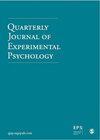EXPRESS: Language structure reflects biases in pattern learning across domains and modalities
IF 1.5
3区 心理学
Q4 PHYSIOLOGY
引用次数: 0
Abstract
A central goal for psychological science is the explanation of variation in human behaviour. In the domain of language, patterns of cross-linguistic variation have been extensively documented, but there has been vigorous debate over how to explain them. A particularly contentious question is whether constraints on linguistic variation are driven by properties of the human mind that are specific to language, or domain general. In this paper, we present four pattern-learning experiments (N=306 English- and Italian-speaking adults) across domains (linguistic and non-linguistic) and modalities (visual, auditory, and tactile) to show that the patterns that are more easily learned are precisely the ones that are found most frequently across languages. This supports a domain-general, cognitive explanation for cross-linguistic variation. However, we suggest that the general/specific dichotomy is ultimately misleading because language structure arises when domain- and modality-general biases meet domain-specific representations.表达:语言结构反映了跨领域和跨模式模式学习的偏差
心理科学的一个核心目标是解释人类行为的变异。在语言领域,跨语言的变异模式已被广泛记录,但如何解释这些变异一直存在激烈的争论。一个特别有争议的问题是,语言变异的制约因素究竟是由语言所特有的人类思维特性驱动的,还是由一般领域所驱动的。在本文中,我们介绍了四个跨领域(语言和非语言)和跨模式(视觉、听觉和触觉)的模式学习实验(N=306 英语和意大利语成人),结果表明,更容易学习的模式正是在不同语言中最常见的模式。这支持了对跨语言变异的领域一般认知解释。然而,我们认为,通用/特异的二分法最终会产生误导,因为当领域和模式的通用偏差与领域的特异表征相遇时,就会产生语言结构。
本文章由计算机程序翻译,如有差异,请以英文原文为准。
求助全文
约1分钟内获得全文
求助全文
来源期刊
CiteScore
3.50
自引率
5.90%
发文量
178
审稿时长
3-8 weeks
期刊介绍:
Promoting the interests of scientific psychology and its researchers, QJEP, the journal of the Experimental Psychology Society, is a leading journal with a long-standing tradition of publishing cutting-edge research. Several articles have become classic papers in the fields of attention, perception, learning, memory, language, and reasoning. The journal publishes original articles on any topic within the field of experimental psychology (including comparative research). These include substantial experimental reports, review papers, rapid communications (reporting novel techniques or ground breaking results), comments (on articles previously published in QJEP or on issues of general interest to experimental psychologists), and book reviews. Experimental results are welcomed from all relevant techniques, including behavioural testing, brain imaging and computational modelling.
QJEP offers a competitive publication time-scale. Accepted Rapid Communications have priority in the publication cycle and usually appear in print within three months. We aim to publish all accepted (but uncorrected) articles online within seven days. Our Latest Articles page offers immediate publication of articles upon reaching their final form.
The journal offers an open access option called Open Select, enabling authors to meet funder requirements to make their article free to read online for all in perpetuity. Authors also benefit from a broad and diverse subscription base that delivers the journal contents to a world-wide readership. Together these features ensure that the journal offers authors the opportunity to raise the visibility of their work to a global audience.

 求助内容:
求助内容: 应助结果提醒方式:
应助结果提醒方式:


